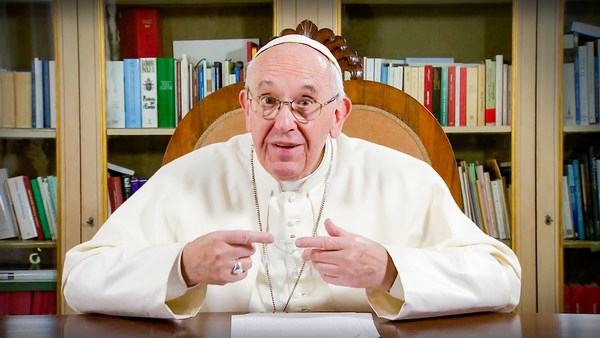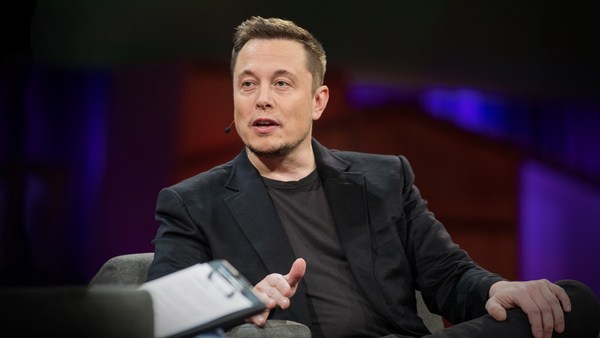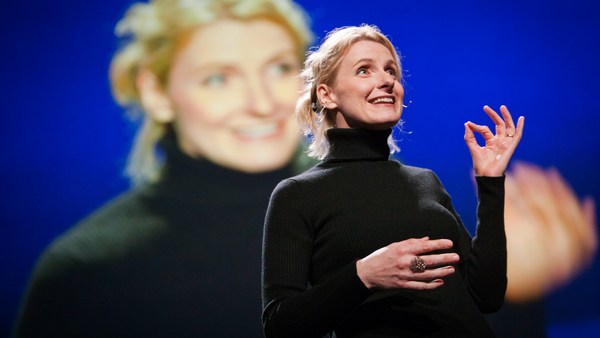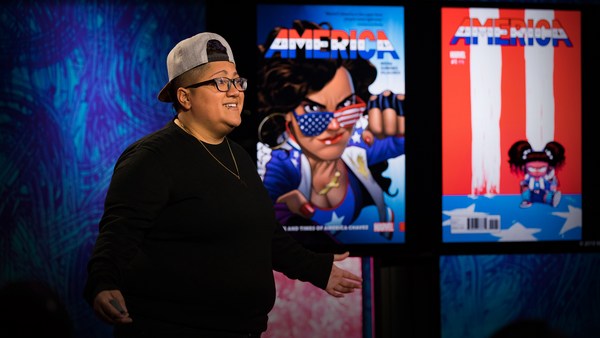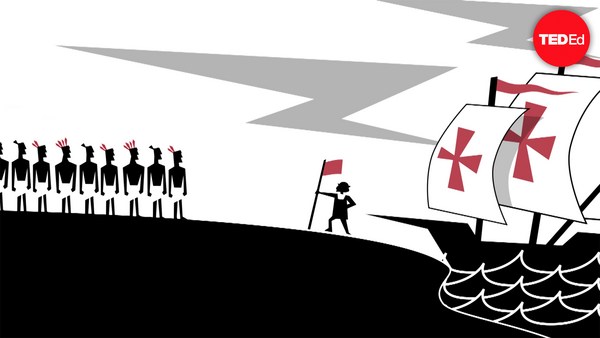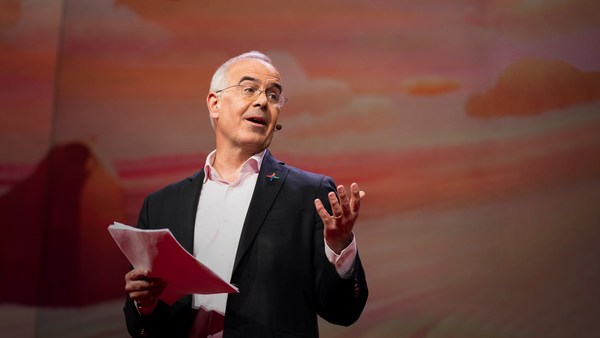Namaskar.
I'm a movie star, I'm 51 years of age, and I don't use Botox as yet.
(Laughter)
So I'm clean, but I do behave like you saw like a 21-year-old in my movies. Yeah, I do that. I sell dreams, and I peddle love to millions of people back home in India who assume that I'm the best lover in the world.
(Laughter)
If you don't tell anyone, I'm going to tell you I'm not, but I never let that assumption go away.
(Laughter)
I've also been made to understand there are lots of you here who haven't seen my work, and I feel really sad for you.
(Laughter)
(Applause)
That doesn't take away from the fact that I'm completely self-obsessed, as a movie star should be.
(Laughter)
That's when my friends, Chris and Juliet called me here to speak about the future "you." Naturally, it follows I'm going to speak about the present me.
(Laughter)
Because I truly believe that humanity is a lot like me.
(Laughter)
It is. It is. It's an aging movie star, grappling with all the newness around itself, wondering whether it got it right in the first place, and still trying to find a way to keep on shining regardless.
I was born in a refugee colony in the capital city of India, New Delhi. And my father was a freedom fighter. My mother was, well, just a fighter like mothers are. And much like the original homo sapiens, we struggled to survive. When I was in my early 20s, I lost both my parents, which I must admit seems a bit careless of me now, but --
(Laughter)
I do remember the night my father died, and I remember the driver of a neighbor who was driving us to the hospital. He mumbled something about "dead people don't tip so well" and walked away into the dark. And I was only 14 then, and I put my father's dead body in the back seat of the car, and my mother besides me, I started driving back from the hospital to the house. And in the middle of her quiet crying, my mother looked at me and she said, "Son, when did you learn to drive?" And I thought about it and realized, and I said to my mom, "Just now, Mom."
(Laughter)
So from that night onwards, much akin to humanity in its adolescence, I learned the crude tools of survival. And the framework of life was very, very simple then, to be honest. You know, you just ate what you got and did whatever you were told to do. I thought celiac was a vegetable, and vegan, of course, was Mr. Spock's lost comrade in "Star Trek."
(Laughter)
You married the first girl that you dated, and you were a techie if you could fix the carburetor in your car. I really thought that gay was a sophisticated English word for happy. And Lesbian, of course, was the capital of Portugal, as you all know.
(Laughter)
Where was I? We relied on systems created through the toil and sacrifice of generations before to protect us, and we felt that governments actually worked for our betterment. Science was simple and logical, Apple was still then just a fruit owned by Eve first and then Newton, not by Steve Jobs, until then. And "Eureka!" was what you screamed when you wanted to run naked on the streets. You went wherever life took you for work, and people were mostly welcoming of you. Migration was a term then still reserved for Siberian cranes, not human beings. Most importantly, you were who you were and you said what you thought.
Then in my late 20s, I shifted to the sprawling metropolis of Mumbai, and my framework, like the newly industrialized aspirational humanity, began to alter. In the urban rush for a new, more embellished survival, things started to look a little different. I met people who had descended from all over the world, faces, races, genders, money-lenders. Definitions became more and more fluid. Work began to define you at that time in an overwhelmingly equalizing manner, and all the systems started to feel less reliable to me, almost too thick to hold on to the diversity of mankind and the human need to progress and grow. Ideas were flowing with more freedom and speed. And I experienced the miracle of human innovation and cooperation, and my own creativity, when supported by the resourcefulness of this collective endeavor, catapulted me into superstardom.
I started to feel that I had arrived, and generally, by the time I was 40, I was really, really flying. I was all over the place. You know? I'd done 50 films by then and 200 songs, and I'd been knighted by the Malaysians. I had been given the highest civil honor by the French government, the title of which for the life of me I can't pronounce even until now.
(Laughter)
I'm sorry, France, and thank you, France, for doing that. But much bigger than that, I got to meet Angelina Jolie --
(Laughter)
for two and a half seconds.
(Laughter)
And I'm sure she also remembers that encounter somewhere. OK, maybe not. And I sat next to Hannah Montana on a round dinner table with her back towards me most of the time. Like I said, I was flying, from Miley to Jolie, and humanity was soaring with me. We were both pretty much flying off the handle, actually.
And then you all know what happened. The internet happened. I was in my late 40s, and I started tweeting like a canary in a birdcage and assuming that, you know, people who peered into my world would admire it for the miracle I believed it to be. But something else awaited me and humanity. You know, we had expected an expansion of ideas and dreams with the enhanced connectivity of the world. We had not bargained for the village-like enclosure of thought, of judgment, of definition that flowed from the same place that freedom and revolution was taking place in. Everything I said took a new meaning. Everything I did -- good, bad, ugly -- was there for the world to comment upon and judge. As a matter of fact, everything I didn't say or do also met with the same fate.
Four years ago, my lovely wife Gauri and me decided to have a third child. It was claimed on the net that he was the love child of our first child who was 15 years old. Apparently, he had sown his wild oats with a girl while driving her car in Romania. And yeah, there was a fake video to go with it. And we were so disturbed as a family. My son, who is 19 now, even now when you say "hello" to him, he just turns around and says, "But bro, I didn't even have a European driving license."
(Laughter)
Yeah. In this new world, slowly, reality became virtual and virtual became real, and I started to feel that I could not be who I wanted to be or say what I actually thought, and humanity at this time completely identified with me. I think both of us were going through our midlife crisis, and humanity, like me, was becoming an overexposed prima donna. I started to sell everything, from hair oil to diesel generators. Humanity was buying everything from crude oil to nuclear reactors. You know, I even tried to get into a skintight superhero suit to reinvent myself. I must admit I failed miserably. And just an aside I want to say on behalf of all the Batmen, Spider-Men and Supermen of the world, you have to commend them, because it really hurts in the crotch, that superhero suit.
(Laughter)
Yeah, I'm being honest. I need to tell you this here. Really. And accidentally, I happened to even invent a new dance form which I didn't realize, and it became a rage. So if it's all right, and you've seen a bit of me, so I'm quite shameless, I'll show you. It was called the Lungi dance. So if it's all right, I'll just show you. I'm talented otherwise.
(Cheers)
So it went something like this.
Lungi dance. Lungi dance. Lungi dance. Lungi dance. Lungi dance. Lungi dance. Lungi dance. Lungi dance. Lungi dance. Lungi dance. Lungi dance. Lungi.
That's it. It became a rage.
(Cheers)
It really did. Like you notice, nobody could make any sense of what was happening except me, and I didn't give a damn, really, because the whole world, and whole humanity, seemed as confused and lost as I was. I didn't give up then. I even tried to reconstruct my identity on the social media like everyone else does. I thought if I put on philosophical tweets out there people will think I'm with it, but some of the responses I got from those tweets were extremely confusing acronyms which I didn't understand. You know? ROFL, LOL. "Adidas," somebody wrote back to one of my more thought-provoking tweets and I was wondering why would you name a sneaker, I mean, why would you write back the name of a sneaker to me? And I asked my 16-year-old daughter, and she enlightened me. "Adidas" now means "All day I dream about sex."
(Laughter)
Really. I didn't know if you know that. So I wrote back, "WTF" in bold to Mr. Adidas, thanking secretly that some acronyms and things won't change at all. WTF.
But here we are. I am 51 years old, like I told you, and mind-numbing acronyms notwithstanding, I just want to tell you if there has been a momentous time for humanity to exist, it is now, because the present you is brave. The present you is hopeful. The present you is innovative and resourceful, and of course, the present you is annoyingly indefinable. And in this spell-binding, imperfect moment of existence, feeling a little brave just before I came here, I decided to take a good, hard look at my face. And I realized that I'm beginning to look more and more like the wax statue of me at Madame Tussaud's.
(Laughter)
Yeah, and in that moment of realization, I asked the most central and pertinent question to humanity and me: Do I need to fix my face? Really. I'm an actor, like I told you, a modern expression of human creativity. The land I come from is the source of inexplicable but very simple spirituality. In its immense generosity, India decided somehow that I, the Muslim son of a broke freedom fighter who accidentally ventured into the business of selling dreams, should become its king of romance, the "Badhshah of Bollywood," the greatest lover the country has ever seen ... with this face. Yeah.
(Laughter)
Which has alternately been described as ugly, unconventional, and strangely, not chocolatey enough.
(Laughter)
The people of this ancient land embraced me in their limitless love, and I've learned from these people that neither power nor poverty can make your life more magical or less tortuous. I've learned from the people of my country that the dignity of a life, a human being, a culture, a religion, a country actually resides in its ability for grace and compassion. I've learned that whatever moves you, whatever urges you to create, to build, whatever keeps you from failing, whatever helps you survive, is perhaps the oldest and the simplest emotion known to mankind, and that is love. A mystic poet from my land famously wrote,
(Recites poem in Hindi)
(Poem ends)
Which loosely translates into that whatever -- yeah, if you know Hindi, please clap, yeah.
(Applause)
It's very difficult to remember. Which loosely translates into actually saying that all the books of knowledge that you might read and then go ahead and impart your knowledge through innovation, through creativity, through technology, but mankind will never be the wiser about its future unless it is coupled with a sense of love and compassion for their fellow beings. The two and a half alphabets which form the word "प्रेम," which means "love," if you are able to understand that and practice it, that itself is enough to enlighten mankind. So I truly believe the future "you" has to be a you that loves. Otherwise it will cease to flourish. It will perish in its own self-absorption.
So you may use your power to build walls and keep people outside, or you may use it to break barriers and welcome them in. You may use your faith to make people afraid and terrify them into submission, or you can use it to give courage to people so they rise to the greatest heights of enlightenment. You can use your energy to build nuclear bombs and spread the darkness of destruction, or you can use it to spread the joy of light to millions. You may filthy up the oceans callously and cut down all the forests. You can destroy the ecology, or turn to them with love and regenerate life from the waters and trees. You may land on Mars and build armed citadels, or you may look for life-forms and species to learn from and respect. And you can use all the moneys we all have earned to wage futile wars and give guns in the hands of little children to kill each other with, or you can use it to make more food to fill their stomachs with.
My country has taught me the capacity for a human being to love is akin to godliness. It shines forth in a world which civilization, I think, already has tampered too much with. In the last few days, the talks here, the wonderful people coming and showing their talent, talking about individual achievements, the innovation, the technology, the sciences, the knowledge we are gaining by being here in the presence of TED Talks and all of you are reasons enough for us to celebrate the future "us." But within that celebration the quest to cultivate our capacity for love and compassion has to assert itself, has to assert itself, just as equally.
So I believe the future "you" is an infinite you. It's called a chakra in India, like a circle. It ends where it begins from to complete itself. A you that perceives time and space differently understands both your unimaginable and fantastic importance and your complete unimportance in the larger context of the universe. A you that returns back to the original innocence of humanity, which loves from the purity of heart, which sees from the eyes of truth, which dreams from the clarity of an untampered mind.
The future "you" has to be like an aging movie star who has been made to believe that there is a possibility of a world which is completely, wholly, self-obsessively in love with itself. A world -- really, it has to be a you to create a world which is its own best lover. That I believe, ladies and gentlemen, should be the future "you."
Thank you very much. Shukriya.
(Applause)
Thank you.
(Applause)
Thank you.
(Applause)
